
Scientists from Norwich Medical School have conducted a study exploring the potential benefits of cranberries on cognitive function in older individuals.
Cranberries are small, red fruits that grow in wet regions of the United States. They have historically been used for various medicinal purposes, including bladder and stomach disorders.
While cranberries are often associated with urinary tract health, their impact on memory function in older people has remained uncertain.
The Link Between Diet and Cognitive Health
Aging is commonly associated with cognitive decline, and certain dietary components have been shown to help prevent this process.
Specifically, (poly)phenol-rich fruits like berries have demonstrated protective effects against age-related neurodegeneration.
Neurodegeneration involves the gradual loss of neuronal cells in specific brain regions and is associated with conditions such as Alzheimer’s and Parkinson’s diseases.
The Study and its Findings
The research team investigated the effects of cranberry powder on cognitive function in 60 older adults aged between 50 and 80 years.
Half of the participants consumed freeze-dried cranberry powder, equivalent to a cup or 100g of fresh cranberries, daily for 12 weeks, while the other half received a placebo.
Cognitive tests, including memory and executive function assessments, were conducted before and after the intervention.
Neuroimaging and blood samples were also collected to evaluate changes in brain function and cognition.
Improved Memory and Cholesterol Levels
The study revealed that consuming cranberries for 12 weeks was associated with improvements in visual episodic memory in older adults.
Visual episodic memory refers to the ability to store a large number of objects, recognize objects despite changes in appearance, and differentiate between visually similar objects.
Furthermore, participants who consumed cranberry powder experienced a significant decrease in low-density lipoprotein (LDL) cholesterol levels.
LDL cholesterol, often referred to as “bad” cholesterol, is a risk factor for heart disease and stroke.
Changes in Brain Activity
The researchers also observed changes in brain activity within the right entorhinal cortex of participants who consumed cranberry powder.
The entorhinal cortex plays a crucial role in memory, navigation, and time perception.
These findings suggest that daily consumption of cranberries over a 12-week period can enhance episodic memory performance and neural functioning.
Future Implications
The study’s results highlight the potential benefits of cranberries for managing or reducing symptoms of brain diseases in older individuals.
Further research is needed to explore the long-term effects and underlying mechanisms of cranberry consumption on cognitive health.
Conclusion
The study conducted by Emma Flanagan et al. indicates that consuming cranberries daily for 12 weeks can lead to improvements in memory function and cholesterol levels in older adults.
The findings suggest that incorporating cranberries into the diet may have positive effects on cognitive health.
Understanding the potential benefits of cranberries can contribute to promoting healthy aging and brain function.
The research was published in the journal Frontiers in Nutrition.
If you care about dementia, please read studies about how the Mediterranean diet could protect your brain health, and Vitamin B supplements could help reduce dementia risk.
For more information about brain health, please see recent studies that a high-fiber diet could help lower the dementia risk, and these antioxidants could help reduce dementia risk.
Copyright © 2023 Scientific Diet. All rights reserved.








